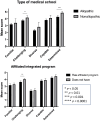Perceptions of Achievability, Representation, and Access to Plastic Surgery Training and Mentorship Among Medical Students
- PMID: 40529220
- PMCID: PMC12173299
- DOI: 10.1097/GOX.0000000000006889
Perceptions of Achievability, Representation, and Access to Plastic Surgery Training and Mentorship Among Medical Students
Abstract
Background: As the path to pursuing a career in plastic surgery becomes increasingly competitive, the intentional promotion of the success of medical students from all backgrounds is critical. This study investigated medical students' perceptions of the field of plastic surgery and beliefs on their ability to pursue a career within it.
Methods: A survey was distributed through the Recruitment of Accomplished & Diverse Medical Student Applicants into Plastic Surgery program, inquiring of medical students' demographics, metrics of academic achievement, and perceptions of the field of plastic surgery using the Likert scale.
Results: Among 178 medical students, White and high-income respondents reported greater familiarity with the field of plastic surgery (P = 0.001, P = 0.0262), had less of a perceived challenge in pursuing the field (P = 0.0481, P = 0.0307), and believed the field to be more diverse (P < 0.0001, P = 0.0017) than minority and lower income respondents. Students from allopathic medical schools and those without an affiliated integrated plastic surgery program perceived the field of plastic surgery as more challenging to enter (P = 0.0002, P = 0.0084). There were no statistically significant differences in the number of research projects, mentors, leadership and volunteer experiences, or the decision to pursue a research year between demographic groups.
Conclusions: Medical students' demographic and educational backgrounds are associated with their perceptions of achievability of, representation in, and access to plastic surgery. This provides insight into the perceived barriers and potential areas of intervention to enable students from all backgrounds to achieve their goal of becoming plastic surgeons.
Copyright © 2025 The Authors. Published by Wolters Kluwer Health, Inc. on behalf of The American Society of Plastic Surgeons.
Conflict of interest statement
The authors have no financial interest to declare in relation to the content of this article.
Figures
Similar articles
-
Osteopathic Graduates in Plastic Surgery: How Can We Improve the Pipeline?Plast Reconstr Surg Glob Open. 2025 Jun 18;13(6):e6907. doi: 10.1097/GOX.0000000000006907. eCollection 2025 Jun. Plast Reconstr Surg Glob Open. 2025. PMID: 40534656 Free PMC article.
-
Surveillance for Violent Deaths - National Violent Death Reporting System, 50 States, the District of Columbia, and Puerto Rico, 2022.MMWR Surveill Summ. 2025 Jun 12;74(5):1-42. doi: 10.15585/mmwr.ss7405a1. MMWR Surveill Summ. 2025. PMID: 40493548 Free PMC article.
-
The Implementation of a Preclinical Plastic and Reconstructive Surgery Mentorship Program.J Surg Educ. 2025 Jul;82(7):103520. doi: 10.1016/j.jsurg.2025.103520. Epub 2025 May 8. J Surg Educ. 2025. PMID: 40345022
-
Transforming dental education: interactive and student-centered learning with team-based learning in the undergraduate program.Front Med (Lausanne). 2025 Jun 3;12:1579237. doi: 10.3389/fmed.2025.1579237. eCollection 2025. Front Med (Lausanne). 2025. PMID: 40529146 Free PMC article. Review.
-
Assessing the comparative effects of interventions in COPD: a tutorial on network meta-analysis for clinicians.Respir Res. 2024 Dec 21;25(1):438. doi: 10.1186/s12931-024-03056-x. Respir Res. 2024. PMID: 39709425 Free PMC article. Review.
References
-
- National Resident Matching Program. Results and data: 2023 Main Residency Match. Available at https://www.nrmp.org/wp-content/uploads/2023/05/2023-Main-Match-Results-.... 2023. Accessed January 12, 2024.
-
- Asserson DB, Sarac BA, Janis JE. A 5-year analysis of the integrated plastic surgery residency match: the most competitive specialty? J Surg Res. 2022;277:303–309. - PubMed
LinkOut - more resources
Full Text Sources
Research Materials



